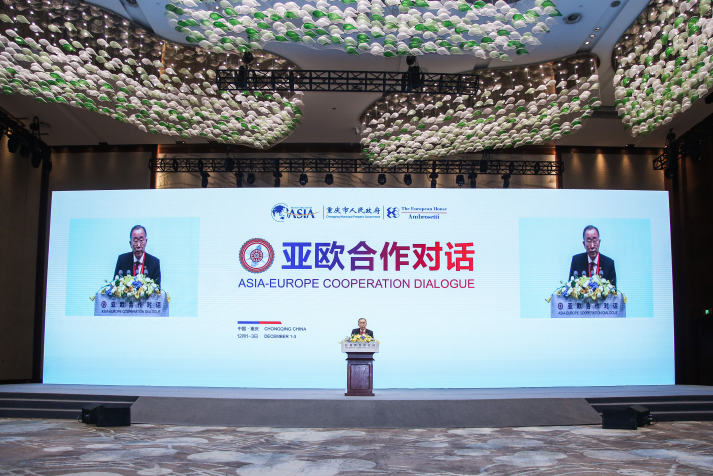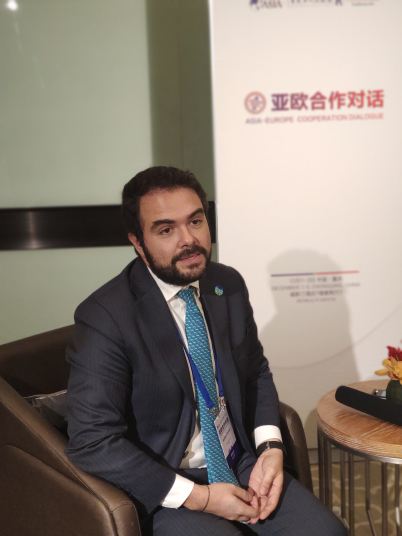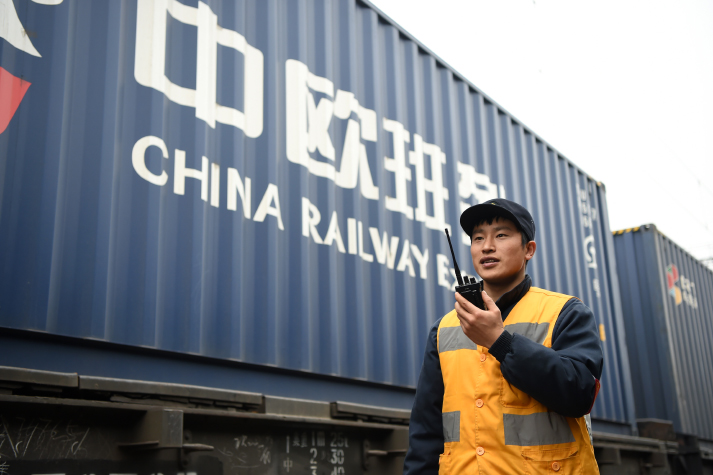| Business |
| For a Stronger Voice | |
| Business leaders stress the importance of Asia-Europe cooperation in coping with global challenges | |
|
|
 Ban Ki-moon, former UN Secretary General and Chairman of the Boao Forum for Asia, delivers a keynote speech at the Second Asia-Europe Cooperation Dialogue in Chongqing on December 2 (COURTESY PHOTO)
Matteo Tanteri is embracing China and so is his company. He is CEO of the China operation of the Italian energy firm Snam, one of the largest gas pipeline operators in Europe, which set up its first office in China in Beijing in 2018. The company signed a strategic cooperation agreement with China National Petroleum Corp., the country's largest oil and gas producer and supplier, at the Second China International Import Expo in Shanghai in November. "For many gas companies today, they are looking to find gas in other regions, but in terms of gas infrastructure, I think the focus is in China," Tanteri said, "We are doing business with local companies and we are starting to work with Chinese energy players." Along with Tanteri, over 400 business people, government officials and leaders of international institutions gathered at the Second Asia-Europe Cooperation Dialogue in the southwestern municipality of Chongqing on December 2 to discuss opportunities emerging from deepening relations. The event was initiated in 2018 by the Boao Forum for Asia (BFA) and the European House-Ambrosetti, an Italian consulting firm, after broad consensus was reached between Asian and European leaders. It was then decided to be held on an annual basis as a platform for in-depth and substantial talks on cooperation.  Matteo Tanteri, CEO of Snam China, at the Second Asia-Europe Cooperation Dialogue on December 2 (COURTESY PHOTO)
Time to bond Protectionism has derailed the momentum of global trade growth, leaving behind a gloomier world economy by the day, Ban Ki-moon, former UN Secretary General and Chairman of the BFA, said in his keynote speech at the opening ceremony. Unilateralist actions have thrown the established world order into chaos, as rules and institutions that have proven effective post-World War II are being disregarded and the globalized world is being fragmented, according to Ban. He warned that the world's common future risks being eroded by the law of the jungle. Against this backdrop, Ban said he hoped the dialogue could represent a stronger voice for multilateralism and an open world economy; more robust trade, investment and financial ties; closer cooperation under the Belt and Road Initiative; and collaborative innovation toward the next technological revolution. Ban said he felt both urgency and confidence in reversing the trend of unilateralism and protectionism at this critical juncture in human history. Asia and Europe combined account for 60 percent of the world's population and 65 percent of the global GDP. This absolute majority of countries are both beneficiaries and staunch supporters of multilateralism and an open world economy. According to Ban, both continents have much to offer each other. Europe has the largest number of developed economies, whereas Asia is mostly a developing world. Different levels of development mean different and mutually complementary advantages. First, traditional ties in trade, investment and financial cooperation could be stronger and more robust. Governments should take bolder actions in trade liberalization and investment facilitation, both bilaterally and multilaterally. In addition, more free trade agreements could achieve a higher level of economic integration across the continents. Second, Asian and European countries should seize new opportunities. The Belt and Road Initiative, an attempt to revive the ancient Silk Road through Asia and Europe, is now in its sixth year. This is an initiative that came from Asia, but depends on the joint efforts of Asia and Europe to succeed. At a time when globalization and international cooperation are set back, the initiative offers a fresh opportunity for Asia and Europe to work together and move forward, Ban said, adding that when global public goods are in short supply, the initiative is proving an effective way to move all countries forward and leave no one behind. Connectivity, both hard and soft, will ensure a freer flow of goods, services, capital and people. Ban predicted that eventually, the initiative will turn Asia and Europe into one continent in the economic sense. Third, faster technological advances are essential to revitalize the lackluster world economy since the global financial crisis in 2008. While Europe has mostly been a technology leader and Asia a learner and follower, this is beginning to change as Asia quickly catches up and may even take the lead in some areas. China, India, Japan and the Republic of Korea have invested heavily in artificial intelligence, big data, cloud computing, the Internet of Things, smart cities, smart manufacturing, the life sciences, new energies and new materials. Europe, for its part, has put in place strategies to drive innovation and lead technology. There is much for Asia and Europe to learn from each other. By working together and giving play to each other's advantages, they could be much closer to the next technological revolution in partnership than in isolation, Ban said. Zhou Xiaochuan, Vice Chairman of the BFA, said while the world economy is suffering from low-speed growth, Asia and Europe should jointly promote trade and investment by defending the multilateral trade system, building infrastructure and improving connectivity. He called on all nations to work together to address climate change and implement the Paris Agreement. While he spoke highly of technology innovation, he also mentioned the importance of a balance between efficiency and social values. Esko Aho, former Prime Minister of Finland, said the technological revolution and aging populations are bringing about radical changes. To survive, Asian and European nations should safeguard the rules-based global order, free trade, globalization and common business models.  A railway worker contacts his colleagues during a maintenance check on a China-Europe freight train in Chongqing on January 25 (XINHUA)
Building links Linking the Belt and Road Initiative and European countries' development strategies was a major topic for many speakers and the three sessions of the dialogue. Chongqing is an example of how much a region can benefit from its integration with the world economy. Hu Hongbing, Deputy Director of the Port and Logistics Office of the Chongqing Municipal Government, said over 4,500 China-Europe freight trains have passed through Chongqing, transporting goods valued at over 160 billion yuan ($22.9 billion) to Central Asia, South Asia and Europe. The city is also a major hub on the New International Land-Sea Trade Corridor, a trade and logistics passage that will link 155 ports in 71 countries and regions upon completion in 2035. The corridor passes through Chongqing and Sichuan Province in southwest China and the Beibu Gulf in Guangxi Zhuang Autonomous Region in south China, shortening the shipping time between Chongqing and Singapore from 25 to just seven days. It offers an alternative for western Chinese provinces and autonomous regions other than shipping goods from the eastern coast. More importantly, it connects the Silk Road Economic Belt and the 21st-Century Maritime Silk Road, the two components of the Belt and Road Initiative. Taking advantage of various transport options including railways, highways and water and air routes, the corridor enables transportation to more regions across the world. (Reporting from Chongqing) Copyedited by Rebeca Toledo Comments to maxiaowen@bjreview.com |
|
||||||||||||||||||||||||||||||
|